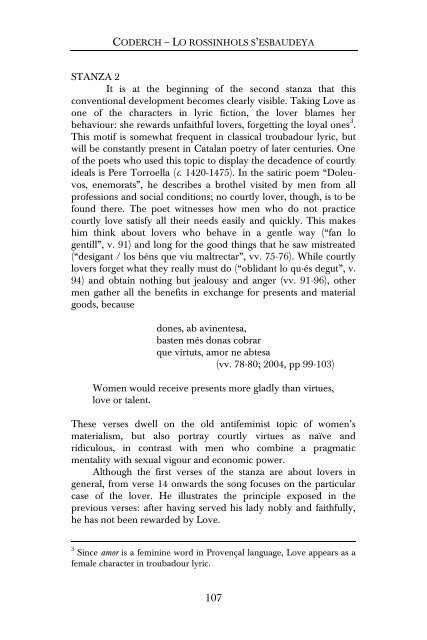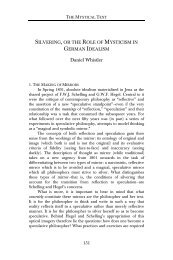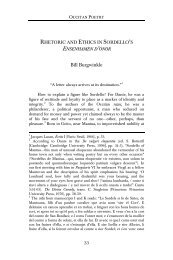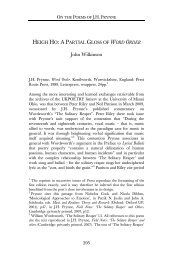Lo rossinhols s'esbaudeya
Lo rossinhols s'esbaudeya
Lo rossinhols s'esbaudeya
Create successful ePaper yourself
Turn your PDF publications into a flip-book with our unique Google optimized e-Paper software.
CODERCH – LO ROSSINHOLS S’ESBAUDEYA<br />
STANZA 2<br />
It is at the beginning of the second stanza that this<br />
conventional development becomes clearly visible. Taking <strong>Lo</strong>ve as<br />
one of the characters in lyric fiction, the lover blames her<br />
behaviour: she rewards unfaithful lovers, forgetting the loyal ones 3 .<br />
This motif is somewhat frequent in classical troubadour lyric, but<br />
will be constantly present in Catalan poetry of later centuries. One<br />
of the poets who used this topic to display the decadence of courtly<br />
ideals is Pere Torroella (c. 1420-1475). In the satiric poem “Doleuvos,<br />
enemorats”, he describes a brothel visited by men from all<br />
professions and social conditions; no courtly lover, though, is to be<br />
found there. The poet witnesses how men who do not practice<br />
courtly love satisfy all their needs easily and quickly. This makes<br />
him think about lovers who behave in a gentle way (“fan lo<br />
gentill”, v. 91) and long for the good things that he saw mistreated<br />
(“desigant / los béns que viu maltrectar”, vv. 75-76). While courtly<br />
lovers forget what they really must do (“oblidant lo qu·és degut”, v.<br />
94) and obtain nothing but jealousy and anger (vv. 91-96), other<br />
men gather all the benefits in exchange for presents and material<br />
goods, because<br />
dones, ab avinentesa,<br />
basten més donas cobrar<br />
que virtuts, amor ne abtesa<br />
(vv. 78-80; 2004, pp 99-103)<br />
Women would receive presents more gladly than virtues,<br />
love or talent.<br />
These verses dwell on the old antifeminist topic of women’s<br />
materialism, but also portray courtly virtues as naïve and<br />
ridiculous, in contrast with men who combine a pragmatic<br />
mentality with sexual vigour and economic power.<br />
Although the first verses of the stanza are about lovers in<br />
general, from verse 14 onwards the song focuses on the particular<br />
case of the lover. He illustrates the principle exposed in the<br />
previous verses: after having served his lady nobly and faithfully,<br />
he has not been rewarded by <strong>Lo</strong>ve.<br />
3 Since amor is a feminine word in Provençal language, <strong>Lo</strong>ve appears as a<br />
female character in troubadour lyric.<br />
107







